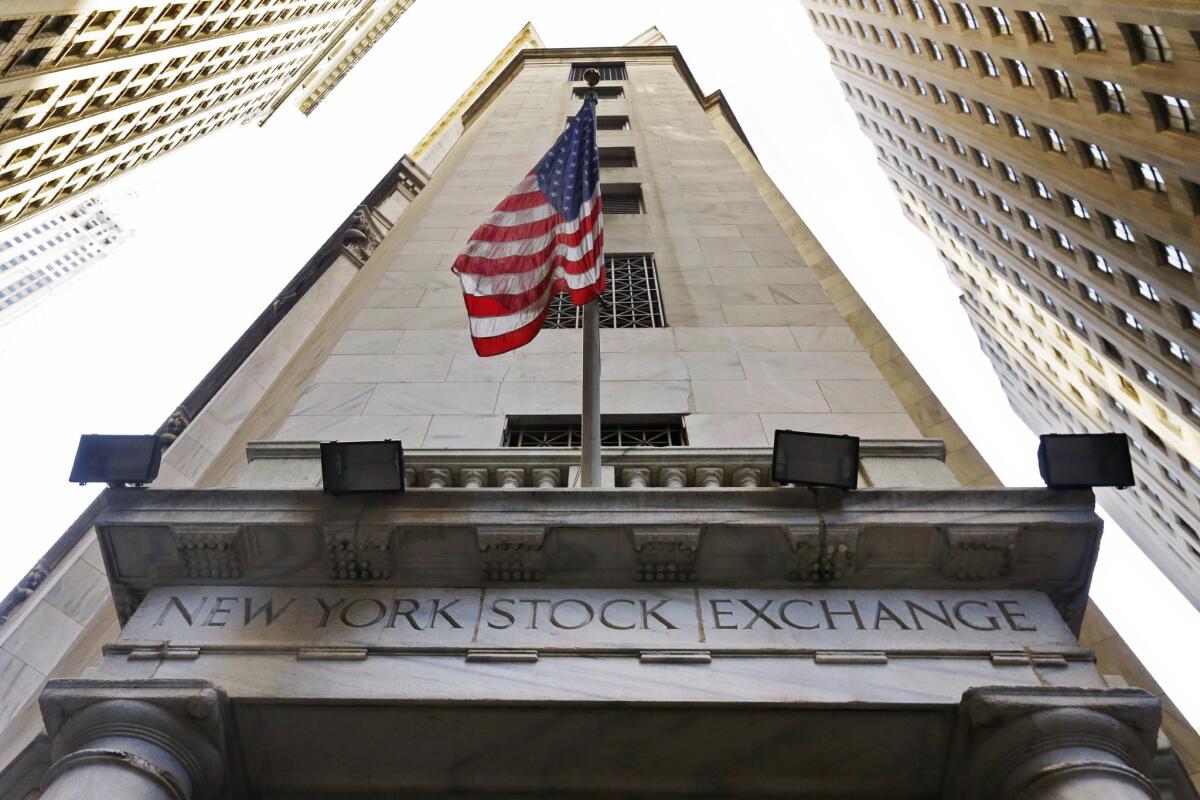Stocks rise to new records in shortened session

Stocks hit fresh records in a shortened trading session Friday as investors continued to bet on a pickup in economic growth and rising corporate profits.
The gains were modest but broad, with nearly every sector in the Standard and Poor’s 500 index rising. Utilities rose the most, up 1.4%.
Indexes have been rising since the presidential election, and the close on Friday capped a third week in a row of S&P 500 gains. The index is up 4% so far this month.
Investors anticipate that plans by President-elect Donald Trump to cut taxes, reduce regulations and spend on infrastructure will speed economic growth.
The Dow Jones industrial average rose 68.96 points, or 0.4%, to 19,152.14. The S&P 500 climbed 8.63 points, or 0.4%, to 2,213.35. The Nasdaq composite added 18.24 points, or 0.3%, to 5,398.92.
Stock trading closed at 10:00 a.m. Pacific time. Trading was relatively quiet as investors returned from the Thanksgiving holiday.
Investors sold bonds again on fear that inflation in the future could eat into their fixed payments. Yields, which move opposite prices, fell. The yield on the 10-year Treasury note rose to 2.36%.
Ten of 11 sectors of the S&P 500 rose. Energy companies fell with the price of oil. ConocoPhillips lost 55 cents, or 1.2%, to $45.75.
Electricity supplier Entergy Energy rose $1.41, or 2.1%, to $69.53. The climb in utilities on Friday reflects investor desire for steady dividends. Telephone companies, which are also big dividend payers, rose, too. AT&T climbed 48 cents, or 1.2%, to $39.21.
Among others stocks making moves Friday, Johnson & Johnson rose $1.06, or 0.9%, to $114.13 after the healthcare company said it is in early talks to buy Swiss drugmaker Actelion.
Deere & Co. rose 1.7%, after rocketing 11% on Wednesday. The maker of agricultural and construction equipment reported a quarterly loss on Wednesday, but it was much less than expected. It closed Friday at $103.92, up $1.75.
Stocks closed higher overseas, too.
Britain’s FTSE 100 and France’s CAC 40 each rose 0.2%. Germany’s DAX climbed 0.1%.
In Asia, Japan’s Nikkei 225 finished 0.3% higher and South Korea’s Kospi edged up 0.2%. Stocks in Hong Kong, Australia, Taiwan, Singapore and other Southeast Asian markets also advanced.
Oil prices fell sharply. Benchmark U.S. crude fell $1.90, or 4%, to $46.06 per barrel in New York. Brent crude, used to price international oils, lost $1.90, or 3.9%, to $47.10 in London.
Investors pushed prices up earlier in the week, but are on edge in anticipation of a meeting of OPEC nations next week. They are meeting to possibly hammer out an agreement on meaningful output cuts.
In other energy trading, wholesale gasoline fell 5 cents to $1.37 a gallon, heating oil lost 5 cents to $1.47 a gallon and natural gas rose 6 cents to $3.09 per 1,000 cubic feet.
The dollar remained at a more than eight-year high against the Chinese yuan, which was trading at 6.92 yuan per dollar. The dollar fell against the Japanese yen, to 113.09 yen from 113.69 yen, while the euro strengthened to $1.0600 from $1.0547.
ALSO
Black Friday shoppers say crowds are smaller than last year
Here’s why you might want to skip those offers for store credit cards
Start-up is pitching a new type of bond to fix California’s wildfire and water woes
UPDATES:
11:00 a.m.: This article was updated after the close of markets.
This article was originally published at 7:15 a.m.
More to Read
Inside the business of entertainment
The Wide Shot brings you news, analysis and insights on everything from streaming wars to production — and what it all means for the future.
You may occasionally receive promotional content from the Los Angeles Times.










